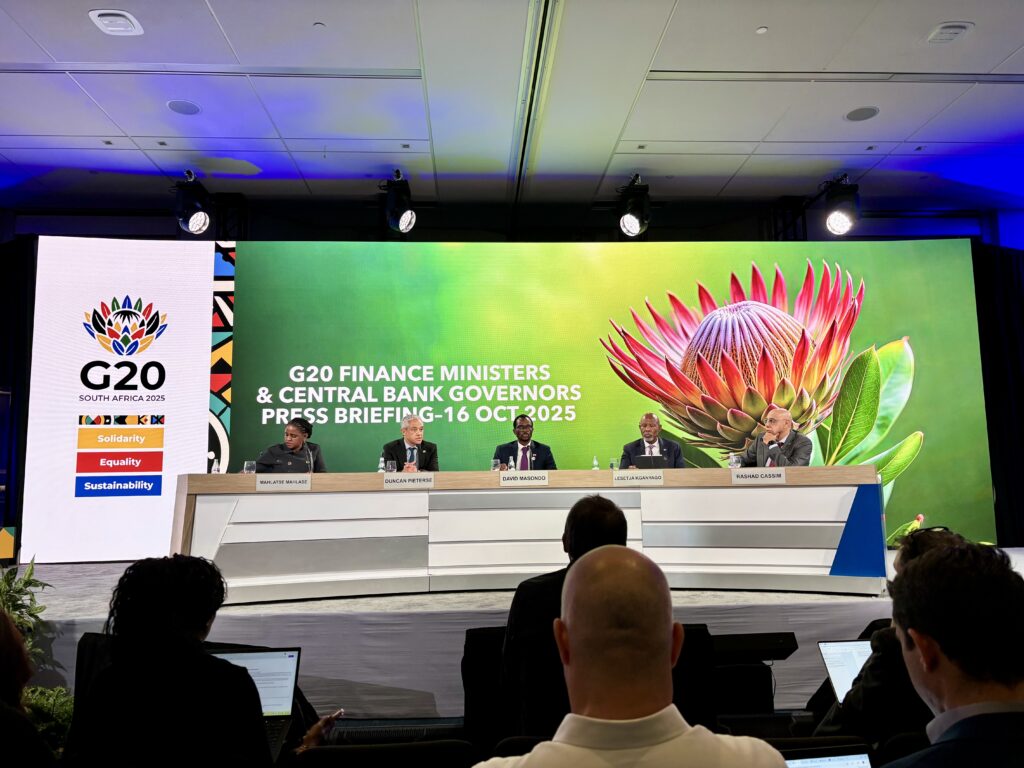Inside the G20’s New Financial Order

By Kemi Osukoya | The Africa Bazaar Magazine
When global finance ministers gathered for the G20 meeting this year, the symbolism was impossible to miss: for the first time, the world’s most powerful economic forum convened on African soil. And this time, Africa wasn’t just in the room—it was at the table.
“The AU was never part of the G20. Three years ago, we had a spectator seat. Now, we have a permanent seat around the table—and that’s a huge advantage for us,” said Neal Rijkenberg, Eswatini Finance Minister, who is also the African Union delegate at this year’s G20 Finance Ministers and Central Bank Governors Meeting.
South Africa’s G20 presidency has reshaped the narrative of global economic cooperation, marking a milestone in how the world engages with Africa’s fast-growing economies. The fourth G20 Finance Ministers and Central Bank Governors meeting under the South African presidency, held in Washington D.C. on the sidelines of the IMF and World Bank Annual Meetings, culminated in the launch of the G20 Africa Engagement Framework—a five-year commitment to keep Africa’s development priorities high on the global agenda.
For African finance ministers like Eswatini’s, this moment represents more than symbolic inclusion; it is about agency, leverage, and the ability to shape financial policy that affects the continent’s future.
At the heart of this year’s discussions was a question that has long vexed African policymakers: Is the international financial system built to serve developing nations, or to constrain them?
“In many ways, the international financial framework is actually hurting developing countries. We’re interested in how we can change that framework to work better,” Rijkenberg said
For decades, African nations have navigated a global credit environment that penalizes risk perception more than it rewards growth potential. Borrowing costs remain stubbornly high—even for reform-minded economies—because of what officials describe as biases among global credit rating agencies. These ratings, often lagging behind fiscal reforms and overstating political risk, drive up interest rates and discourage private investment.
PARTNER’S PRODUCT
At this year’s meeting, African representatives pressed the G20 to recognize and correct those imbalances. As South Africa’s National Treasury Director-General, Dr. Duncan Pieterse, put it, the issue goes beyond perception—it’s about voice.
“Enhancing the voice of borrower countries is a key part of the G20’s debt sustainability declaration. We must ensure developing nations can challenge the data and methodologies used to define their economic credibility,” underscored Pieterse.
South African Reserve Bank Governor Lesetja Kganyago went further, calling for technical capacity-building so African nations can replicate and challenge rating agency models—a power few currently possess.
RELATED VIDEO
“When agencies downgraded South Africa in 2017 and 2020, they predicted debt-to-GDP would hit 94 percent. Eight years later, it’s 76 percent. They were wrong,” SARB Governor Kganyago said.
Africa’s Digital and Financial Leap
Beyond the debt debate, the conversation turned to the technologies reshaping global finance—AI, stablecoins, and cryptocurrencies—and Africa’s unconventional advantage. While advanced economies fret over job losses and regulatory risks, Africa sees a window to leapfrog.
“Financial inclusion is still quite low in Africa. Using virtual currencies could be a huge leap in getting people banked. Once financially included, the world opens up,” said Rijkenberg.
With its youthful population and agile fintech sector, Africa could harness digital currencies and AI tools to expand access and reduce transaction costs. Yet, the same tools that promise inclusion also carry threats—currency substitution, volatility, and capital flight, Eswatini’s Finance Minister warns. That duality framed one of the summit’s liveliest debates: how can Africa innovate without being left exposed?
From the Margins to the Mechanism
Perhaps the most enduring outcome of the G20 Finance Ministers and Central Bank Governors Meeting is the institutionalization of Africa’s role within global financial governance. Under the newly launched G20 Africa Engagement Framework, G20 members will work with African partners on key priorities—from climate finance and infrastructure to digital inclusion and debt sustainability.
The initiative builds on Germany’s “Compact with Africa,” but crucially, it places African institutions—the AU, the African Development Bank Group, United Nations Economic Commission for Africa—at the core of shaping and monitoring outcomes.
“It’s about ensuring Africa’s issues are now part of the long-term G20 discussions, not just a one-off agenda item,” said Eswatini Finance Minister Rijkenberg
A Presidency with Purpose
For South Africa, hosting the G20 amid global economic uncertainty was both a diplomatic victory and a test of leadership. The country’s G20 legacy will likely rest on two deliverables: the Africa Engagement Framework and the first-ever G20 Ministerial Declaration on Debt Sustainability.
That declaration signals a long-overdue recognition: that Africa’s economic resilience cannot thrive under a financing system that punishes rather than supports development.
As the world turns its attention to the upcoming G20 Leaders’ Summit, African policymakers are determined that this year’s momentum doesn’t fade.
“Africa’s agenda must not just make it to the summit—it must stay on the table,” said David Masondo, South Africa’s Deputy Finance Minister,
Market analysts agreed that Africa’s expanded presence within the G20 could bring greater policy predictability and access to blended financing instruments. The renewed focus on debt transparency, financial inclusion, and credit rating reform could also unlock new avenues for infrastructure investment, particularly through multilateral partnerships.
The challenge, however, remains implementation. Without coordination between G20 members, African institutions, and private capital, the framework risks becoming another well-intentioned communique. But for now, African leaders are relishing their new position—not on the sidelines, but in the room where the global economy is being redesigned.




